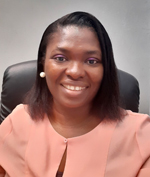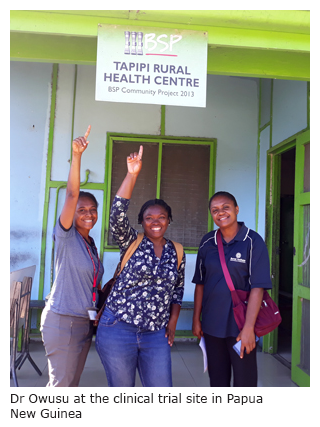
Training partner organization:
- Foundation for Innovative New Diagnostics (FIND), Geneva, Switzerland
Highlight during fellowship:
- Managed implementation of clinical trial of highly sensitive malaria rapid diagnostic test in pregnant women in Papua New Guinea
Post-fellowship highlights:
- Organized seminars and workshops on diagnostic clinical trials at the Disease Surveillance Department of the Ghana Health Service and University of Ghana
- Appointed as Coordinator of Special Programmes/Programme Accreditation, at the Department of Medical Laboratory Sciences, University of Ghana
- Currently leading a multi-disciplinary research team at the University of Ghana on climate change and its effect on infectious diseases, nutrition and biodiversity at the inception stages.
The TDR Clinical Research and Development Fellowship (CRDF) allows early- to mid-career researchers in low- and middle-income countries to learn how to conduct clinical trials. Successful applicants are placed for 12 months in host training organizations (pharmaceutical companies, including members of the International Federation of Pharmaceutical Manufacturers & Associations, product development partnerships, or research organizations) and then receive a reintegration grant for 12 months at their home institution. The fellowship is jointly implemented by TDR, the UNICEF/UNDP/World Bank/WHO Special Programme for Research and Training in Tropical Diseases, and the European & Developing Countries Clinical Trials Partnership (EDCTP). The fellowship is supported by the Bill & Melinda Gates Foundation. View the current call for applications here.
My passion for research is two-pronged – it’s a means to satisfy my never-ending curiosity about life and also a means to contribute to the development of my community. My PhD in Infectious Diseases at the University of Amsterdam aimed at identifying tailor-made interventions for malaria, HIV and sickle cell disease in Ghana, since these three diseases geographically overlap in Ghana. It has been 12 years since I got into active research, and I still relish identifying health needs in my community, formulating research questions, and conducting research to find answers to those questions. It’s the least I can do for my country, as a researcher.
Clinical trial of malaria rapid diagnostic test
As a recipient of the TDR Clinical Research and Development
Fellowship I worked with the Malaria Team at FIND, under the close
supervision of Dr. Xavier Ding. He took a personal interest in ensuring
that I gained experience in the different aspects of their work as
scientific officers. He entrusted me with a project, where I managed the
implementation of a clinical trial of a highly sensitive malaria rapid
diagnostic test (HS-RDT) in pregnant women in Papua New Guinea. I saw
the project through proposal completion, ethics approval, shipment of
materials and equipment to study site, commencement of project,
monitoring of project (both remotely and on-site) and close-out of
study. I was also part of the team that developed the first electronic
case record from (eCRF) which was used for this project.
 The
life-span of the HS-RDT project was longer than my fellowship period, so
my supervisor contracted me as an external consultant to continue
working on the HS-RDT project, upon my return to Ghana. I conducted the
monitoring visit and close-out visit of the study site in Papua New
Guinea, after my return to Ghana. I am also currently working on two
systematic reviews on malaria biomarkers and the global distribution of
Plasmodium malariae, ovale and knowlesi (non-vivax/non-falciparum) with
another Malaria Team member, Dr Seda Yerlikaya.
The
life-span of the HS-RDT project was longer than my fellowship period, so
my supervisor contracted me as an external consultant to continue
working on the HS-RDT project, upon my return to Ghana. I conducted the
monitoring visit and close-out visit of the study site in Papua New
Guinea, after my return to Ghana. I am also currently working on two
systematic reviews on malaria biomarkers and the global distribution of
Plasmodium malariae, ovale and knowlesi (non-vivax/non-falciparum) with
another Malaria Team member, Dr Seda Yerlikaya.
During the fellowship, I also had the opportunity to work with the Clinical and Regulatory Department on writing standard operating procedure (SOP) for the different activities and protocols as the organization worked towards achieving ISO certification.
Sharing knowledge and experience
In the past 10 months of my being back home in Ghana, my focus has been on sharing all the knowledge and experience I gained during my fellowship with my research colleagues and graduate and undergraduate students.
I organized and also facilitated a series of seminars and workshops at the Disease Surveillance Department of the Ghana Health Service and the University of Ghana respectively. These seminars and workshops focused on knowledge sharing on the conduct of diagnostic clinical trials; clinical studies monitoring; and using the Global Health Network (TGHN) website and its Professional Development Scheme (PDS) in capacity development. I have made it a habit to share tips and tricks with undergraduate and postgraduate students I supervise at my university as well.
Challenges encountered during and after fellowship
The fellowship, like any other undertaking, was not without its challenges. However, I took them as opportunities or stepping stones, to further my professional development.
While waiting for the renewal of my appointment at my home institution in Ghana (School of Biomedical and Allied Health Sciences, College of Health Sciences, University of Ghana), I took the opportunity to do an internship with the Disease Surveillance Department and International Health Regulations (IHR) of the Ghana Health Service. There, I was able to impart my knowledge and experience gained during my fellowship to their capacity building activities and disease programmes, whilst at the same time learning more about emergency preparedness for outbreaks in Ghana.
I have now resumed my position at the University of Ghana and am leading a multi-disciplinary research team on climate change and its effect on infectious diseases, nutrition and biodiversity at the inception stages.
As a family woman, leaving my husband and children behind for one year was the most difficult thing for me and for them. Of course, I got the chance to return home for a visit once, and they also came over to visit during the summer, which made it easier for us. Nonetheless, the knowledge and experience I have gained from this fellowship makes all of this well worth it. I have encouraged colleagues to apply for this fellowship and will continue to do so.

